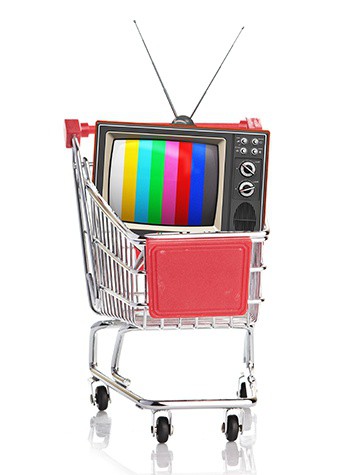What happens in Ramadan doesn’t stay in Ramadan. Actually it’s more of an intensive mini model of how the society really is all year long. People get mad and throw tantrums a week before Ramadan. Have you ever wondered what this is about? Why would a peaceful religious tradition be practiced in such a violent way? Why would people care more about consumption than virtue as they claim they do?
Well, welcome to the secret world of spells and black magic, also known as mass media. We hear preachers every year criticizing the amount of money spent on media production, artists’ wages and costs of shooting locations, but why do we criticize something of our own doing? It’s like blaming your child for who they grew up to become. Each penny in the television industry is a reflection of our spending habits, and how much we became addicted to consumption in a sickening way. Advertisements here, advertisements there, advertisements everywhere! Just take a look around you while you’re stuck in Cairo traffic on any bridge; you’re bombarded by what marketers call “Forced Ads”. There are major corporations and institutes doing nothing but researching our personalities, our preferences, our needs and even the needs we don’t have yet. Somehow, they all try to convince us to buy things we will never need by some fake promise of excellent quality or a sleazy lie called a bargain.
Take a tour in your neighborhood one week before Ramadan and visit supermarkets. Look at the people, how ill they look, take a look at yourself too, maybe you’re one of them. We all have a disease called shopping fever. In economics they tell students to study consumer behavior in terms of supply and demand, and that demand is the initial determiner of supply, but there are exceptions for every rule and they give an example of fashion. When fashion chooses certain colors or designs to be the coming trend they set their supply first hand creating a culture of trend obsessed masses. Then we demand, not because we need or want but because we were told to. It happened for instance a few years ago with slim ties and neon colors.
Same thing happens in Ramadan, but it’s more fierce, because fasting makes us panic. It’s like one of these apocalypse movies. The media has convinced us that we need to take shelter from an illusion called deprivation, we need to feel insecure all the time so that they can control us.
We live in a material world, most of us surrender to this fact and very few don’t. April Lane Benson, New York psychologist and author of “To Buy or Not to Buy: Why We Overshop and How to Stop” says that sometimes, people acquire objects as a way of dealing with chaos and feeling out of control. It may also be related to childhood. Parents may have given presents instead of time and attention, leading a child to grow up wanting to get more material possessions. Other people may have grown up with a lot of emotional or financial deprivation, and when they’re able to afford shopping for themselves, they overbuy as a way of not going back to the way things were. Another theory is that “we buy as a way of trying to deal with our fears of death and the inevitability of death”.
She also added that shopping addicts are especially vulnerable because retailers play up the hysteria of limited chances at bargain prices. Someone with feelings of low self-esteem might equate having a good holiday with buying things. Especially given the slumping economy of the past few years, consumers are made to feel that, with regard to making certain purchases, it’s now or never.
Consumption is a coping strategy for depression, we’re sad, very sad and we turn to objects to heal, they work sometimes but they never cure unfortunately. We feel so powerless all the time because we are controlled and the only power we have is the purchasing power of our earnings, that’s why people are so obsessed about money because it gives power or at least that’s what we think. But what does money really do to us? It enslaves us? We get attached to it and more of it, we think we’re invincible and we think we can have everything and when we do have everything, there will come a time when we leave it all willingly, some statistics on the correlation between wealth and depression claim that 50% of people who commit suicide are wealthy and have all their basic needs met the other 50 % who don’t kill themselves turn into the villains they always hated, which in our case means, those who own the money and the power to control the lives of others through the media; marketing and advertising are very dangerous weapons and they’re not double edged, maybe they were in the good old days but now they only have one edge that masters slow deaths; another form of slavery through programming the mind. Money is the biggest illusion of control, so if you want power through money, be careful what you wish for, it’s a mad world out there!
Nadine Badrawy is a freelance writer and translator. She’s been a writer for four years as well as a copywriter. Now she is focusing on therapeutic writing.
Facebook: Nadine Badrawy
E-mail: nadine.ali.elbadrawy@gmail.com

